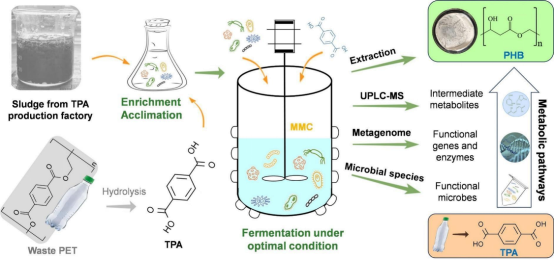

Biosynthesis of polyhydroxyalkanoates (PHA) from waste plastics offers a sustainable solution to mitigating plastic pollution for circular economy. Terephthalic acid (TPA), derived from polyethylene terephthalate (PET) hydrolysis, shows potential as a carbon source for PHA production. However, the isolation of microbial strains with high efficiency in converting TPA to PHA remain a significant challenge. In this study, a microbial consortium enriched from sludge during the flask experiments was employed for fed-batch fermentation in a 5 L bioreactor to facilitate the conversion of TPA to PHA. The fermentation process achieved a maximum PHA concentration of 2.25 g/L with a yield of 0.10 gPHA/gTPA. The dominant microorganisms and TPA transformation pathways were analyzed by genome annotation and intermediate metabolites identification. The consortium exhibited synergistic interactions, with member species producing specific enzymes that sequentially transformed TPA into protocatechuic acid or catechol, ultimately yielding acetyl-CoA as the PHA biosynthesis precursor. This study establishes a sustainable approach for upcycling waste PET plastics into biodegradable polymers. The revealed metabolic mechanisms provide fundamental insights for future improvement of PHA production.
